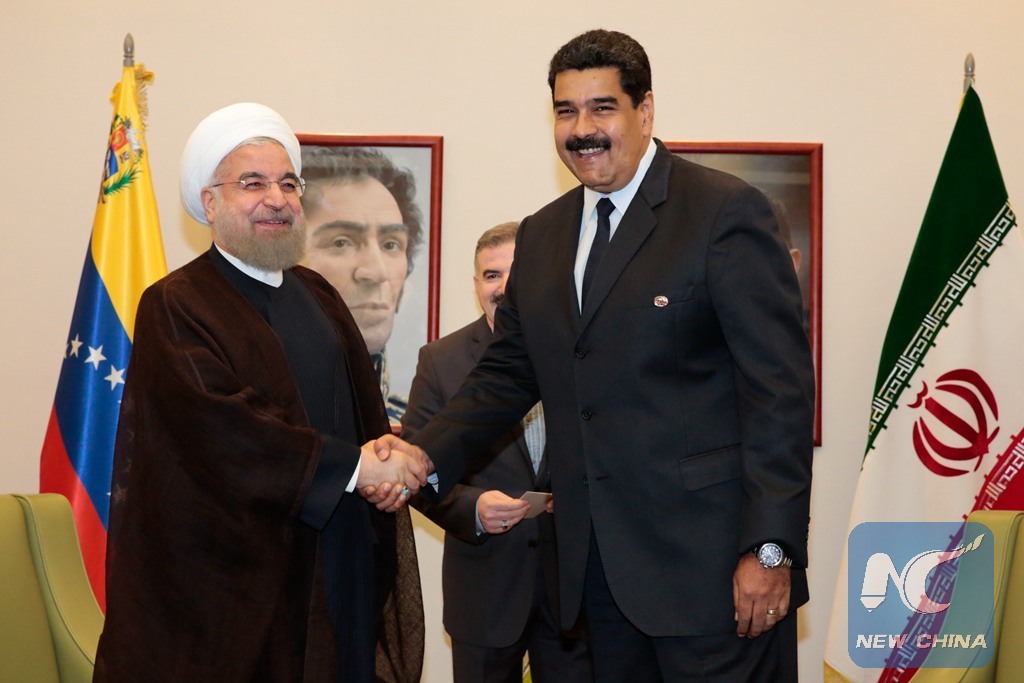Iranian and Venezuelan companies are looking for ways to continue economic cooperation, even increase bilateral trade, against the backdrop of American sanctions that were slapped on the South American country at the end of August.
At a meeting held in Iran’s Foreign Ministry in Tehran on Thursday, representatives from Iranian and Venezuelan companies discussed mechanisms to continue economic and commercial activities, and see how Iranian companies in Venezuela can leverage opportunity.
Iran is involved in several joint ventures in Venezuela worth several billions of dollars, in sectors including energy, agriculture, housing and infrastructure. Iran has opened an ammunition factory, a car assembly plant, a cement factory, and established routes for direct flights between Tehran and Caracas on Iran Air. Trade between the two countries has grown steadily since the early 2000s. The Venezuelan government and a high-level delegation from Iran had inked six deals on scientific, technological, economic and health cooperation in June 2015.
But while the value of industrial development projects carried out by Iranian firms in Venezuela is said to be in the billions of dollars, bilateral trade is relatively low.
In 2011, for example, Iranian exports were just under $65 million, putting it at number 37, according to data compiled by Trading Economics. In the same year, imports fared even worse: At $78,720, Venezuela not only exported less to Iran than countries like Zimbabwe ($2.54 million), Cuba ($401,000), Ethiopia ($171,000) and the Republic of San Marino ($144,530), but is one of the lowest-ranked exporters to Iran from Latin America.
As neither country is a stranger to American and European sanctions, two tend to offer political and economic support to each other. Bilateral ties gelled during the tenures of former Iranian president Mahmud Ahmadinezhad and Venezuela’s Hugo Chavez in the beginning of the century, as both bucked what they described as American “imperialism,” particularly loathing the Bush administration.
“The late President Hugo Chavez had correctly predicted that Iran is an emerging power in the twenty first century, both in the [South American] region and the entire world, underlining the need for strengthening strategic ties with Tehran,” Venezuelan President Nicolas Maduro said in a meeting with Iran’s Foreign Minister Mohammad Javad Zarif during his visit to Caracas in August 2016.
Iran has been hard hit by the downfall of global oil prices, which began to slump in early 2014. Some say Saudi Arabia launched the price war together with the US, but regardless of how it was started, the Iranian economy was able to manage the depression.
Venezuela’s economy, on the other hand, has been a completely different picture. Inflation hit an all-time high of 800 percent in December 2016, and within the first seven months of the current year it stood at 248.6 percent. The Trump administration’s new sanctions imposed on Venezuela prevent it from borrowing or selling assets in the US financial system, only worsening the country’s financial situation. The new embargo is expected to exacerbate shortages of food and other essential goods, including medicine, while severely limiting the policy options available to pull Venezuela out of what is a deep depression.
On August 11, when pressed by reporters, President Trump said a US “military option” with regards to intervention in Venezuela is possible, as the ruling regime there consolidates its power.
"We have many options for Venezuela, including a possible military option, if necessary," Trump told reporters at his New Jersey golf club.
Following Trump’s remarks, CIA Director Mike Pompeo said Venezuela is overrun with Iranians and Hezbollah, Iran's Lebanon-based Shia proxy militia.
“Venezuela could very much become a risk for the United States of America. The Cubans are there; the Russians are there, the Iranians, Hezbollah are there. This is something that has a risk of getting to a very, very bad place, so America needs to take this very seriously,” Pompeo said.
According to the Middle East Institute, Iran’s Islamic Revolution Guards Corps (IRGC) has helped Venezuela’s Ministries of Defense and Interior train civilian, pro-government militias, known as colectivos. (“collective” in Spanish). The IRGC’s training has modeled Iran’s paramilitary Basij forces.
The founder of Iran’s Islamic Republic, Ayatollah Khomeini, established the Basij the same year as the 1979 Islamic revolution that swept Iran’s last shah, or king, from power. With a presence in all Iranian provinces, today the all-volunteer auxiliary force helps advance the regime’s ideological and political agenda. Members of the organization, which is now under the IRGC’s leadership, function as religious activists, aid workers, intelligence agents and morality police.







 President Ilham Aliyev shed light on the evolving contours of the peace process with Armenia during an international conference in Baku this week. ...
President Ilham Aliyev shed light on the evolving contours of the peace process with Armenia during an international conference in Baku this week. ...
 Azerbaijan and Armenia started the process of demarcation of their border on Tuesday, with the installation of the first border markers based on ge...
Azerbaijan and Armenia started the process of demarcation of their border on Tuesday, with the installation of the first border markers based on ge...
 Russian Foreign Minister Sergei Lavrov has reasserted that Moscow has no intentions to stop the fighting in Ukraine, even if peace talks commence.
Russian Foreign Minister Sergei Lavrov has reasserted that Moscow has no intentions to stop the fighting in Ukraine, even if peace talks commence.
 Iran has refuted reports of alleged damage to Shimon Peres Negev Nuclear Research Centre located southeast of Dimona, Israel, during the recent air...
Iran has refuted reports of alleged damage to Shimon Peres Negev Nuclear Research Centre located southeast of Dimona, Israel, during the recent air...



